Wow, I can’t believe it’s another Phreaky Friday already. TGIPF, right? Or any kind of Friday for that matter. And if you work an off-shift and today is your Wednesday (or God forbid, your MONDAY)…well, I’m sorry. But the rest of us are freaking PUMPED. (You can laugh at us next week.)
So the other day I read yet another email from an industry professional that said “your not going to believe this”.
Really? Is that before or after I get over my new belief that you flunked high school English?
Now admittedly this person is not a writer, per se. But he has a Master’s degree in Engineering, works at a large, reputable corporation, and—let’s face it—we really ARE talking about high school grammar here.
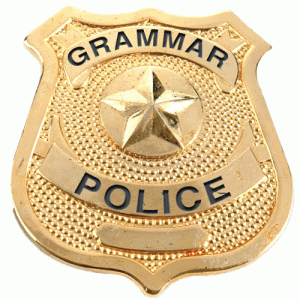 Unfortunately I’ve seen more than a few writers use the same form of the word above in the same (incorrect) context. I’ve even witnessed such egregiousness in the first pages of novels I sampled. At one time I was keeping track of the various books and the collection of (mostly unforgivable) grammatical errors but then I realized I didn’t want to have that information. I would never “out” a fellow Indie no matter how poor the grammar—it’s not my place. Yes, when I was a kid I dreamed of being a cop, but I never once even hinted at being a member of the Grammar Police. I speak in generalities, never about specific authors, so why document it? Honestly, when I see such things I simply click the little “x” at the top of the sample and move along.
Unfortunately I’ve seen more than a few writers use the same form of the word above in the same (incorrect) context. I’ve even witnessed such egregiousness in the first pages of novels I sampled. At one time I was keeping track of the various books and the collection of (mostly unforgivable) grammatical errors but then I realized I didn’t want to have that information. I would never “out” a fellow Indie no matter how poor the grammar—it’s not my place. Yes, when I was a kid I dreamed of being a cop, but I never once even hinted at being a member of the Grammar Police. I speak in generalities, never about specific authors, so why document it? Honestly, when I see such things I simply click the little “x” at the top of the sample and move along.
Problem is, each incident leaves a little splinter lodged in the back of my conscience. These errors are out there and they are being seen by consumers, publishers, other writers, and a host of other industry people who (like me) are beginning to doubt the overall quality level of the slushpile out there.
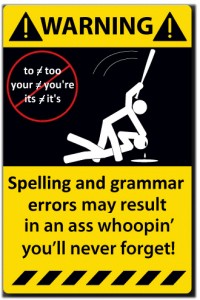 Any of you who have been reading my blog of late know that a recurring theme is the state of the Indie marketplace. I am a part of that marketplace, so the things that happen there affect my profession. That’s why I write about it so much. Recently there were some very astute comments made on one of my blogs regarding writers (particularly Indie writers) needing to employ editors and proofreaders. Russell Blake made a most compelling call for Indies (and all writers) to make this a top priority in the process of releasing their books.
Any of you who have been reading my blog of late know that a recurring theme is the state of the Indie marketplace. I am a part of that marketplace, so the things that happen there affect my profession. That’s why I write about it so much. Recently there were some very astute comments made on one of my blogs regarding writers (particularly Indie writers) needing to employ editors and proofreaders. Russell Blake made a most compelling call for Indies (and all writers) to make this a top priority in the process of releasing their books.
I couldn’t agree more. Errors such as the one mentioned above are normally not typos. I am not excusing typos either, but we all know that every author makes them (it’s nearly impossible to type out 60,000+ words of anything and not leave a few miscues). I have read plenty of books by traditionally published authors—well-known authors, even—and seen a typo here and there. That said, I’ve never seen one littered with grammatical, punctuational, and typographical errors.
I read an Indie book recently that used the word “loose” in place of “lose” throughout the manuscript (as in “don’t loose your nerve”). I’m talking a few dozen times at least. Maybe more. And it was an otherwise well-written book. My best guess at the time was that the author did a “search and replace” at some point and shot themselves in the foot (not once or twice but with a Gatling gun).
Even a mediocre proofreader would never have let that slip by.
Here’s the rub: it really doesn’t matter whether mistakes like those mentioned above are made inadvertently by a careless “search and replace” or whether the writer really doesn’t know the difference. If the book is otherwise well-written and the story is worth being told, the writer owes it to themselves first and foremost to make their art as honed as it can possibly be. They also owe it to their readers and, finally, their peers.
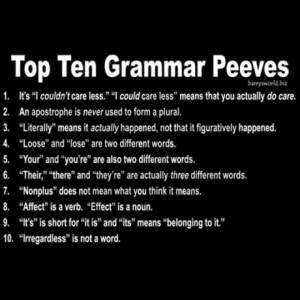 Yes, I know it costs money. And if you are posting to a free website by all means do (or don’t do) whatever you please with your own work. But if you have decided to put your writing in the marketplace and charge readers money for your product, you need to make sure it is edited and proofread.
Yes, I know it costs money. And if you are posting to a free website by all means do (or don’t do) whatever you please with your own work. But if you have decided to put your writing in the marketplace and charge readers money for your product, you need to make sure it is edited and proofread.
[NOTE: My own personal distinction between “editor” and “proofreader” is this: an editor makes deeper suggestions about the storyline, particular passages, style, etc.; a proofreader looks for typos, basic grammar misuse, format, punctuation, capitalization, etc. This is my own distinction I make when choosing a service, fee, etc. For the record, basic proofreading services can be found at quite reasonable rates. More in-depth editing services cost a bit more.]
Here is the list I call The Flagrant Five:
1. There / their / they’re
2. Your / you’re
3. Lose / Loose
4. To / too / two
5. Its / it’s
There are others. Some more egregious, some less so.
Affect/effect.
Imply/infer.
Who/whom.
i.e/e.g
Most of the writers I know cringe at the thought of poor grammar (particularly when we’re talking The Flagrant Five). They (and I) cringe most at the thought of such heinous usage showing up in our own writing. None of us is perfect. We all make mistakes. Hard as we try, crap slips through. Errors pile up.
That’s what editors and proofreaders are for.
You don’t always have to pay, though I recommend it. I know writers who use relatives and/or friends. That’s fine, if your mother/brother/wife/husband/etc. happens to be a retired English teacher. Seriously. A second set of eyes is always better, and they’ll undoubtedly catch a few things you missed, but when the manuscript is as good as you (and your relatives) can make it, you really should consider a professional. (And like any other service, do your research. Ask around. Request references.)
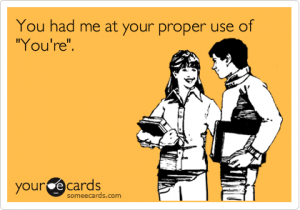 Your book is a reflection of you. It’s your art.
Your book is a reflection of you. It’s your art.
da Vinci’s Mona Lisa.
Sinatra’s “My Way”.
Kerouac’s On the Road
Whether or not your book ever becomes a historical classic (and here’s hoping it DOES), it will always be a classic to you.
And it will be around forever. I think about that every time I release a book:
It will be around for others to read forever.
A hundred years from now.
Two hundred.
Who knows what reader will download one of my books from the ‘Net? (Although if it’s still on Amazon I am guessing it will be free, and discovered in the “Oldest Books That Never Became Classics” section.)
I tell you this, though: the last thing I want is for my great-great-great grandson to put my book down, lean back in his space-aged recliner and say “my ancestor was a freaking idiot.”
Of course he’ll probably end up saying that anyway, but hopefully it won’t be because I confused their, they’re, and there.
~~~~~~~~~~~~~~~~~~~~~~~~~~~~~~~~~~
The blank page is dead…long live the blank page.
~~~~~~~~~~~~~~~~~~~~~~~~~~~~~~~~~~
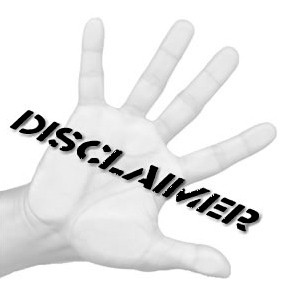 Author known to use spontaneous satire, sarcasm, and unannounced injections of pith or witticisms which may not be suitable for humorless or otherwise jest-challenged individuals. (Witticisms not guaranteed to be witty, funny, comical, hilarious, clever, scintillating, whimsical, wise, endearing, keen, savvy, sagacious, penetrating, fanciful, or otherwise enjoyable. The Surgeon General has determined through laboratory testing that sarcasm can be dangerous, even in small amounts, and should not be ingested by those who are serious, somber, pensive, weighty, funereal, unsmiling, poker-faced, sober, or pregnant.)
Author known to use spontaneous satire, sarcasm, and unannounced injections of pith or witticisms which may not be suitable for humorless or otherwise jest-challenged individuals. (Witticisms not guaranteed to be witty, funny, comical, hilarious, clever, scintillating, whimsical, wise, endearing, keen, savvy, sagacious, penetrating, fanciful, or otherwise enjoyable. The Surgeon General has determined through laboratory testing that sarcasm can be dangerous, even in small amounts, and should not be ingested by those who are serious, somber, pensive, weighty, funereal, unsmiling, poker-faced, sober, or pregnant.)



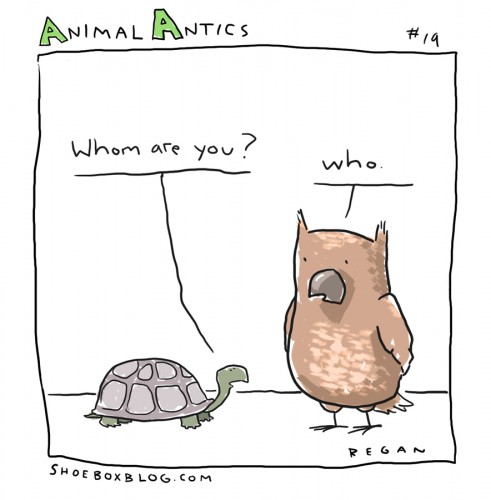
I agree. If more indie authors used professional editors, they might be able to reduce the bad press self-published books have gotten because of poor writing and grammar. What’s also important to note is that a writer may be good with grammar and spelling but may not know the craft of writing.
Lynnette Labelle
http://www.labelleseditorialservices.com
Agreed, Lynnette! Many times I’ve read a writer who is grammatically masterful yet could not tell a decent story if the story came up, bit him, and offered to tell itself. 😉 Thanks for the read and the comment.
Great post! Sure, it’s hard to catch every typo. I’m sure there are a few in my book. But I’ve read so many e-books that are rife with them to the point of distraction. There are two main schools of thought I’ve encountered among authors concerning errors: 1. I can’t afford an editor or proofreader; 2. This is my art, take it or leave it. I can’t do much about those in the second camp. As for the first group, they need to know that the fees they pay an editor/proofreader/cover designer/formatter are tax deductible. Also, some editors/proofreaders are willing to bargain. Just ask!
A couple of EXCELLENT points, Laurie! Those expenses are tax-deductible and yes, you really can find reasonably-priced editors and/or proofreaders! 🙂
Nice post, Rob.
This topic drives me nuts. Rather, the errors I encounter drive me nuts. I find them everywhere: online (on mainstream news outlet websites!), in printed books . . . all over the place. And here’s the REAL issue: EVERY TIME I SEE A TYPO, THE SOURCE OF THE DOCUMENT LOSES CREDIBILITY.
For example, the TWILIGHT books were loaded with typos. I recently found a couple in a Stephen King novel, as well as in FAHRENHEIT 451. (What? Yes! What?! YES!)
Tanya Huff’s military science fiction series starring ass-kicking, bad-ass marine Torin Kerr was LOADED with typos. And the problem grew worse as each book progressed, and worse still as the series progressed. I began to wonder if Tanya became weary as she wrote each book, as if her interest began to flag or she was simply sprinting to the end. In her defense, I’ve got about 25k words to go on my current sci-fi/romance WIP, and I’m feeling it; I really want to reach THE END. But the problems I found in her books were flat out ridiculous. Words misspelled. Words missing from sentences. The books/stories themselves were fantastic; I really enjoyed them. But somebody was asleep at the wheel.
These errors elicit two emotions in me:
1. Anger, because this is a serious business, and such errors are not all right. What happens, for example, when a surgeon amputates the wrong leg because some dipsh*t put the x-ray onto the lightboard backwards? Lawsuit from hell! And deservedly so! But the only recourse we have as readers is to stop reading (and perhaps leave a review on Amazon or Goodreads). It’s a small, quiet protest; but it’s all we can do.
2. Joy, because it shows me that no one is perfect, and that there is hope because if globally-accepted bestsellers can get away with a couple typos, it shows me that what people care about most of all is STORY. Like you said, Lynette, simply having a relatively firm command of language does not automatically translate into the creation of a solid, well-told narrative. That is a much deeper, more complex skill acquired only through a lot of reading and writing and rewriting.
That being said, we must always strive for perfection in our writing, but understand that this striving must not be allowed to get in the way of progress; we learn by DOING. Writers learn to write by WRITING. And by reading. Like Natalie Goldberg said, “If you read good books, when you write, good books will come out of you.” If you don’t know who Natalie Goldberg is, you ought to. Search for her in Amazon, buy WRITING DOWN THE BONES, then buy Rob’s books. Then get back to your own writing.
Oh, one other thing:
If anyone ever finds a typo or error in one of my books, tell me. I proofread til my eyes bleed, so if there is something I missed, I definitely (desperately?) want to know about it so I can fix it immediately.
Me, too. And as I mentioned to Fred—if any writer feels their ego is bruised by such corrections, methinks they need to imagine what it will feel like knowing all their readers are seeing the incredible pile of faux pas!
WRITING DOWN THE BONES is one of my BIBLES! Great, necessary, MUST READ. I have mixed feelings, though, about your apparent willingness to forgive such myriad typos because of the quality of the story (you clearly feel as strongly as I do about the need for professionalism but you seem to read these authors anyway, albeit in “silent protest”). While I of course agree wholeheartedly that story is what matters, for me (and a lot of readers, I think) I’ll put the book down if there are as many as what you described. A few? No problem—as you mentioned re: King and others, they happen (not unlike like shit) ;). My fear is that, like Laurie said, people will resort to “this is my art, take it or leave it”. As much as I respect you, Ryan (and you KNOW I do!), I think most people are less forgiving than you and in addition to the quiet protest of a poor review, will stop buying/reading such garbage, story or no. My own take is there are plenty of excellent stories out there within which I do not find myself having to wade through ruined grammar and prickly punctuation. 😉
Love your responses. I honestly think one day you should round them all up and turn them into a book. We can combine them with some of the blogs you were commenting on and make it a cooperative effort! Seriously, I learn more through reading your responses than half the writing books I’ve read (the food for thought alone is worth the reading). Thanks, man!
Thank you Rob. I agree with everything you said. The most important thing is that writers can have a good story to tell without mastering Herr Dr. Grammar … author tells story, proofreader proofreads. Ezra Pound took a red pencil to Ernest Hemingway’s fiction in Paris. There is nothing to be ashamed of …
YES! That’s why I like to distinguish between proofreader and editor. I understand some authors’ feeling that what they have written can/should stand on its own via their own artistic vision (an author does so, of course, at their own peril: good story versus bad story, perhaps). But if there are grammar issues—particularly serious ones, whether by type or number—that to me becomes the unforgivable crime. And as Ryan points out in his second comment, who would not want to have such errors corrected before publication? Ego should have nothing to do with it; which stings worse, the deserved criticism (corrections) of one fellow professional or humiliation before a million readers? (And yes, I am being facetiously optimistic in using “a million”—an author can dream, can’t he?) 😉
Thank you Rob! Your “Flagrant Five” also drive me a little (or maybe even a lot) nuts. Do you suppose that’s because you and I both studied with the same incredible instructor in the wilds of Wyoming?
If I may, I’d like to share another pet peeve of mine – apostrophe misuse and outright abuse. For some reason people everywhere believe that every “s” deserves an apostrophe. I regularly drive past a flower shop that proudly displays a banner advertising “Flower’s”, and a condo development marketing “Condo’s”. It makes me want to take a spray can of red paint along and make proof marks to help them out.
Oh, and while I’m thinking of it, past/pass. 🙁
And love, Love, LOVE the most recent snippet of “Dark Prairies” you shared. Cannot wait to read it beginning to end.
THANK YOU! I am hopefully within a week of first draft completion and then, ahem, the EDITOR/PROOFREADER process. You will be one of the very first to know when it’s released!!
I believe our instructor was wise in more ways than ONE. 😉 I couldn’t agree more about your own pet peeve. I’ll let you in on a little embarrassing secret: I read Strunk & White’s Elements of Style for fun (particularly the section on “common” errors like those listed. 🙂
Wow! I can’t believe I read this piece to the end. As an indie author who loves to read books, I can say that of all the pile of novels I have read, I am yet to find ONE without an error. That includes even the traditionally published books. With indie books I have encountered more mistakes mixed with great story telling and engaging dialogue. Sometimes I laugh so hard, my eyes water, yet the errors persist. I am equally guilty. Grammar isn’t my strong suit but I tell good stories. A fellow author mailed me once to advice me to check the grammar in one of my novels. I genuinely thanked her for her constructive feedback. Other readers mail me to share their experiences about the heart tugging stories I sew together. Interestingly, I have attempted to read some novels written by authors who have very good command of English, and I have struggled to get to the end of chapter one. It’s so well written, it screams BORING and has no spark. As you all have rightly said, we must strive to get it right on all front. I belong to the school of thought that what is worth doing is worth doing well. Can any one recommend a credible, reasonably priced editor/proof reader? I’d love to polish my books. Great post and responses. I’m off to sleep.
Hi, Stella. I wasn’t sure how to take your first line.;) I think you’ve accentuated a key point here: if you tell great stories, let the editor help with the polishing! The story needs to get out there—we can’t all be experts in grammar; some are just damn good storytellers! Thanks much for the read and the comment. 😀
I’m a real stickler when it comes to mistakes in what I read. The one thing I’ve noticed is most people use spell check and since the words aren’t misspelled, they aren’t caught. I can’t afford an editor, but read and reread my work countless times and I am fortunate that my critique readers are a school teacher and an English Lit. Professor, who also teaches a writing class. Good post!
Yes, Karen, spell check is both a writer’s friend and worst enemy. Makes us lazy (me included). Ah the dual-edged sword of technology. 🙂
Hi Rob –
Great work here. I appreciate your evaluation of the different tasks an editor and a proofreader perform. I’d like to add, that an editor also proofs the manuscript for the same types of grammatical errors that a proofreader looks for, on top of adding value via her/his storyline suggestions.
As an Indie, I too, have concerns about the quality of work in our marketplace. My risk management advice is this; a minimum of two high quality edits should be performed on a finished manuscript prior to publication. The two outsourced edits are above and beyond our own (the author’s) painstaking edits. Certainly, a third and fourth edit can be done, as well.
REMEMBER WRITERS: Errors in punctuation, grammar, and typos hinder the word flow. This greatly tarnishes the reading experience and certainly the enjoyment level decreases. If our words and sentences don’t flow smoothly, readers drop off at an alarming rate.
Thank you and enjoy your weekend.
Thanks much, Charlie. You really nailed the main point, too: such errors destroy the rhythm and flow of the writing. Breaks it into unworthy pieces. And you can’t have enough edits, that’s certain. Cheers, my friend!
I’m not claiming not to have sinned while I write this, by any means, and while I love technology I have to admit I blame phones and social networks for the crap English I have witness of late. One pet hate of mine is knowing someone is at university level (or passed it) and reading messages that have no exclamation or interrogation marks and no captalization. I see it as either laziness and I wonder how on Earth do they write their essays?
Amen, Paula. The whole “texting revolution” with no care for capitalization, punctuation, etc. just bugs the bejezzus out of me. 🙂 Thanks for the comment!
Allow me to clarify a bit on my statement regarding errors vis-a-vis story quality. For me, the difference seems to be perception: a “real” book vs. a “not-so-real” book, and the distinction between the two seems to be its status as a traditionally-published book. Despite what we say about how loathsome traditional publishers may be, a traditionally-published book has nevertheless been vetted to a greater degree than most indie books. It is a natural assumption, therefore, to expect a higher degree of quality. This is precisely why I was so shocked by the sheer number of errors in Tanya Huff’s VALOR series, likewise by the TWILIGHT books, which weren’t as bad.
But if I’m reading an ebook put out by an indie writer and it’s full of errors, I stop reading. My tolerance is lower. I assume that if they put so little time into the mechanics of the writing, the mechanics of the story will be likewise lacking. And I simply don’t want to spend five hours reading such a book. I try to read books which will impress me, which will teach me something as a storyteller and as a human being, and which will give me something to strive for. When I read, I want to feel that I am in the hands of a master storyteller. I want to get lost in the story; I do not want to wear my Reader hat with my Editor/Shit Detector hat perched precariously on top of it.
Similarly, when I write, edit, and publish a work, I try my best to create a work which will create a cohesive, enjoyable reading experience into which a reader can be immersed, so that at the story’s end, the reader can feel they’ve been on a journey, glimpsed another world, and have no regrets for allocating some of their precious time to the reading of my tale and the acquaintance of my characters. The goal is to put on a show without the reader seeing any of the mechanics which went into the show’s creation. No one wants to see the card up the magician’s sleeve. They want to believe, if only for a short time, that magic exists, and that they’ve witnessed it and been a part of it.